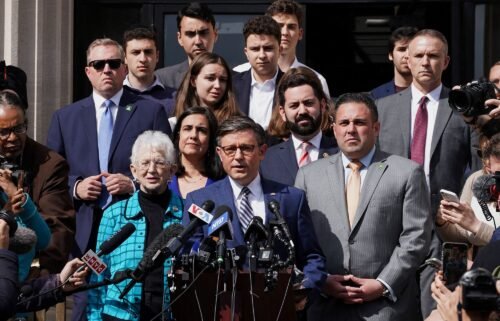Bloomberg unveils public option health care plan in line with Biden, Buttigieg

Michael Bloomberg will unveil a public option health insurance plan on Thursday in Memphis, Tennessee, that places the former New York mayor more in line with moderate candidates like former Vice President Joe Biden and South Bend, Indiana, Mayor Pete Buttigieg and firmly against the progressive “Medicare for All”-style approach championed by Massachusetts Sen. Elizabeth Warren and Vermont Sen. Bernie Sanders.
The Bloomberg plan would offer a “Medicare-like public option,” allowing Americans to enroll in an insurance plan administered by the federal government but paid for by consumer premiums. It would also expand federal subsidies on the Obamacare exchanges, capping premiums at 8.5% of a household’s income, and allow those with employer coverage to access these subsidies if they buy policies on the individual market.
The uninsured and low-income Americans who live in states that haven’t expanded Medicaid would receive priority enrollment. Also, the low-income in non-expansion states would not be charged premiums for the public option. The benefits in the public option will be the same as what is offered in the Affordable Care Act, the significant health care law that was signed into law by former President Barack Obama.
“Every American deserves coverage and quality, affordable care — and we will get it done,” Bloomberg is expected to say, according to his campaign. “To do it, we won’t take away private insurance — as some candidates would. My proposal will instead build on what works: President Obama’s Affordable Care Act. We’ll make sure that people who like their private insurance can keep private insurance, while also providing coverage to the uninsured. We don’t need Medicare for All proposals that are more likely to re-elect Donald Trump than expand coverage.”
Bloomberg’s plan stands in direct opposition to Medicare for All, the sweeping, government-run health insurance plan that has been backed by Warren, Sanders and the left of the Democratic Party.
Bloomberg health care advisers, on a call with reporters to announce the plan, said Bloomberg did not back Medicare for All because he wants to propose “something that can get done.”
“If we just look at the makeup of the Congress and what is likely to be the makeup of the Congress in 2021, that is just not going to pass,” said a Bloomberg health care adviser. “It’s not that he doesn’t support the values of Medicare for All, it’s that he wants something that is achievable and can get done.”
The Bloomberg proposal would keep private insurance, something that a Medicare for All-style approach essentially eliminates. This has become a flashpoint in the Democratic debate over health care.
Like Biden and Buttigieg, Bloomberg feels that introducing a public option would increase competition in the private insurance market and lower everyone’s premiums. Bloomberg is also considering automatically enrolling certain uninsured, low-income Americans into the program. Biden and Buttigieg would auto enroll these folks either in the public option or Medicaid.
However, Bloomberg’s team also sees their proposal as different than his moderate rivals who are pitching public option plans.
“We don’t see the public option as a pathway to Medicare for All,” said an adviser, who added that Bloomberg’s plan does not want to be “too disruptive” to the current insurance system.
Buttigieg, in particular, has said he sees his public option as a pathway to Medicare for All.
Bloomberg’s plan is built on four principles: Proposing a public option; rolling back the changes President Donald Trump has made to the Affordable Care Act; reducing health care prices by banning surprise medical bills and capping charges from out-of-network providers at 200% of Medicare rates, and lowering drug prices by authorizing the health and human services secretary to negotiate drug prices with pharmaceutical companies and capping the price of drugs at 120% of the average price in other developed nations.
The former mayor would also limit Medicare beneficiaries’ out-of-pocket prescription drug costs to $2,000 a year. And he would add an optional policy to Medicare that covers vision, dental and hearing benefits for $25 a month, while requiring all states to cover oral care for adults in Medicaid.
Also, Bloomberg would create a reinsurance program to help insurers with high-cost patients, reducing premiums more widely.
Bloomberg, however, would not seek to reinstate the individual mandate — which requires Americans to have health insurance or pay a penalty. This Affordable Care Act provision was essentially repealed by Congress, effective this year. Instead, he would launch an aggressive enrollment effort.
“We are trying build on what is working well and fix what isn’t, such as the health care cost component,” said a Bloomberg health care adviser.
Bloomberg’s team has yet to do a comprehensive pricing analysis on the plan, but they expect it to cost roughly $1.5 trillion over 10 years, and for a third of that to be paid for by cost savings in the plan, like by banning surprise medical bills, capping out-of-network charges and saving money on drug prices. Advisers did not specify how the rest would be covered.
The Bloomberg campaign, according to the health care adviser, expects some of the cost to be paid for by a “yet-to-be-released tax reform package.
“We intend to raise sufficient revenue to pay for our policy proposals. While some of the savings will certainly come from the health care plan, we will also get additional revenues from elsewhere in the federal budget,” the adviser said.
Health care has consistently been the more important issue to the Democratic electorate and Bloomberg, who made a late entrance into the 2020 race, is having to play catch-up on a conversation that has played out for months.
The Bloomberg adviser said the mayor is uniquely qualified to pass health care reforms, in part, because he is not taking money from health care interest groups.
“We think that Mike can actually take a leadership role. Trump has not been able to be a leader … He hasn’t been a champion of those issues and going to Congress and trying to make it happen,” the adviser said. “We think if there was more leadership, you would see more movement on both the drug pricing issues and the surprise billing issue and the cap on prices.”



